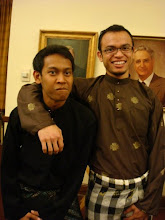

These are two books I recently bought to condone my over-worked brain after doing tons of readings on Data Mining for my latest Proof of Concept for Telekom Malaysia Churn Model (I will write another post on the experience of working and presenting the case - a hell of experience).
First is Brideshead Revisited. I saw the film version 1st before buying the book. Evelyn Waugh's piece, which is listed by Time as one of the one hundred best English-language novels from 1923 to present, Brideshead Revisited was quite cleverly translated onto the silver screen by Jeremy Brock and Andrew Davies (yeah, after reading the book, I kinda understand why it needs to be done by two people). Knowing that it was translated from a book, I began to "see" the screenplay and imagined it being expressed on the book. And I did the same thing for The Last Station a German/Russian/British biopic about Count Leo Tolstoy by Jay Parini, of which a film stars Christopher Plummer as Tolstoy and Helen Mirren as Sophia Tolstaya.
From an amateur storyteller perspective, I concluded that it is quite hard to transform a written novel into a motion picture. I've read Atonement and Pride and Prejudice both the screenplays and the novels. They, the screenplays and the novels, are quite different in a many ways. I found that the hardest work is to keep the actors' and the scenes' emotions and feelings same as you read the novels, or perhaps taking them into another level, while keeping the plots moving smoothly.
Yes, at the end of the day, nobody gives a sh*t about the technicality behind the transformation. What counts the most in watching an artistic film is the feeling and the emotions being conveyed. But, for those people like me, perhaps, who takes literature to the heart, the process of transformation could be an interesting and crucial part.
These are lines conveyed by the talented English actor, Matthew Goode as Charles Ryder, in Brideshead Revisited (Din, you might want to watch the whole scene on him eloquently pointing out the difference between a picture and a painting, or rather a good picture and a good painting.)
"Because, a camera is a mechanical device which records a moment in time, but not what that moment means or the emotions that it evokes. Whereas, a painting, however imperfect it may be is an expression of....feeling. An expression of love. Not just a copy of something"
and The Last Station opens with Leo Tolstoy quote
"Everything I know, I know only because of you"
I've yet to read the screenplay of both films and see how it's was being translated from the original piece as I've been trying to find them! Can anybody help me with this?


0 comments:
Post a Comment